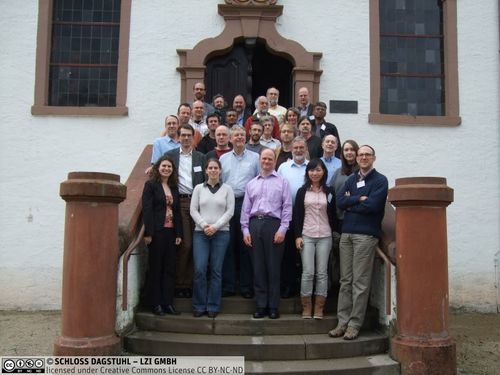Dagstuhl-Seminar 10131
Spatial Representation and Reasoning in Language: Ontologies and Logics of Space
( 28. Mar – 01. Apr, 2010 )
(zum Vergrößern in der Bildmitte klicken)
Permalink
Bitte benutzen Sie folgende Kurz-Url zum Verlinken dieser Seite:
https://www.dagstuhl.de/10131
Organisatoren
- John A. Bateman (Universität Bremen, DE)
- Anthony Cohn (University of Leeds, GB)
- James Pustejovsky (Brandeis University - Waltham, US)
Kontakt
- Annette Beyer (für administrative Fragen)
Programm
The goal of this seminar was to bring together researchers from diverse disciplines to address the spatial semantics of natural language, the interface between spatial semantics and geospatial representations, and the role of ontologies in reasoning about spatial concepts in language and thought. There are five themes that were addressed in this seminar:
- Designing and reasoning with spatial ontologies;
- Representing and processing spatial information in language;
- Identifying appropriate spatial logics for linguistic expressiveness;
- Mapping and normalizing spatial representations for geospatial tasks and domains;
- Integrating temporal and spatial ontologies and logics for reasoning about motion and change.
To this end, we invited researchers from the following areas: spatial and temporal logics, qualitative reasoning, ontologies and knowledge representation, natural language processing, geographic information systems, and computational semantics. As a result of the discussion from this seminar, we expect the following milestones and agreements to emerge:
- Coordination on ontologies for space and time;
- Initial consensus on spatial representations derived from language;
- Strategies for mapping linguistically derived spatial information to GIS baseline representations.
- John A. Bateman (Universität Bremen, DE)
- Brandon Bennett (University of Leeds, GB) [dblp]
- Nate Blaylock (IHMC - Pensacola, US)
- Robert J. Bobrow (BBN Technologies - Cambridge, US)
- Stefano Borgo (ISTC - CNR, Trento, IT)
- Max J. Egenhofer (University of Maine, US) [dblp]
- Carola Eschenbach (Universität Hamburg, DE)
- Kenneth D. Forbus (Northwestern University - Evanston, US) [dblp]
- Andrew U. Frank (TU Wien, AT) [dblp]
- Christian Freksa (Universität Bremen, DE) [dblp]
- Christopher Habel (Universität Hamburg, DE)
- Jerry R. Hobbs (USC - Marina del Rey, US) [dblp]
- Joana Hois (Universität Bremen, DE)
- Oliver Kutz (Universität Bremen, DE) [dblp]
- Inderjeet Mani (Sunnyvale, US) [dblp]
- David McDonald (BBN Technologies - Cambridge, US)
- Till Mossakowski (Universität Bremen, DE) [dblp]
- Jessica Moszkowicz (Brandeis University - Waltham, US)
- Amitabha Mukerjee (Indian Institute of Technology - Kanpur, IN)
- Philippe Muller (Paul Sabatier University - Toulouse, FR)
- Ian Pratt-Hartmann (University of Manchester, GB) [dblp]
- James Pustejovsky (Brandeis University - Waltham, US) [dblp]
- Angela Schwering (Universität Münster, DE) [dblp]
- Marc Verhagen (Brandeis University - Waltham, US) [dblp]
- Stephan Winter (The University of Melbourne, AU) [dblp]
- Stefan Wölfl (Universität Freiburg, DE) [dblp]
- Yunhui Wu (The University of Melbourne, AU)
- Joost Zwarts (Utrecht University, NL)
Klassifikation
- artifical intelligence
- robotics
- data bases
- information retrieval
- semantics
- formal methods
- verification
- logic
- interdisciplinary
Schlagworte
- language of space
- spatial ontologies
- reasoning about space and time
- mapping language to GIS


